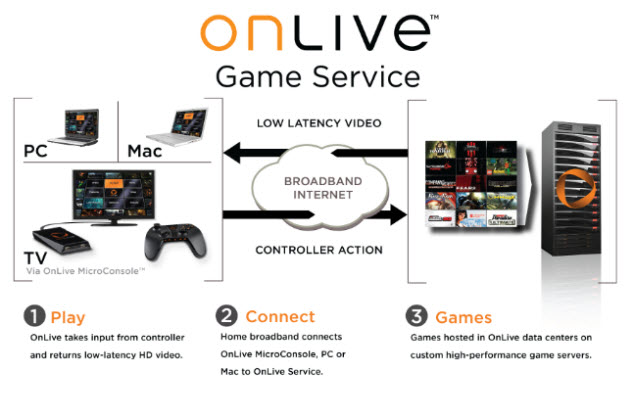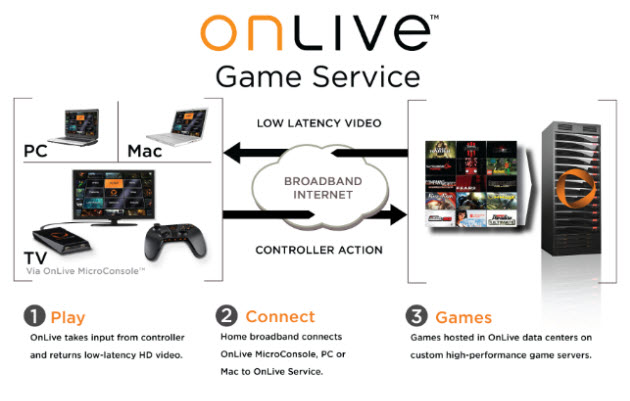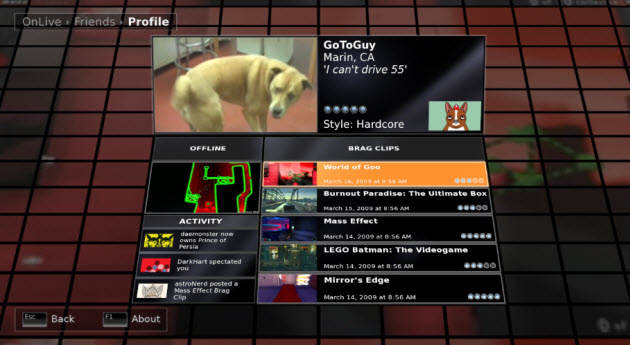OnLive hasn’t launched its games on demand service in the U.S. yet. But in a sign of growing momentum, the company announced today that it has a partner that will launch its service Belgium and Luxembourg.
Under the terms, the Belgacom Group will take a 2.6 percent stake in OnLive. It joins other investors including AT&T, Warner Bros., Autodesk, Maverick Capital, and BT.
The deal follows Palo Alto, Calif.-based OnLive’s announcement last week in a similar deal with the U.K.’s BT. Belgacom will get the exclusive right to bundle the OnLive game service in Belgium and Luxembourg with other broadband services. But gamers in these countries will also have the option of ordering directly from OnLive through any internet service provider. Belgacom will offer multi-language support. The launch will happen after the U.S. launch in June, but no details on timing are available now.
OnLive is rapidly becoming the company to beat in games on demand. Rivals include Otoy, Gaikai, InstantAction, and GameStreamer. OnLive, founded by entrepreneur Steve Perlman, has been working on the service for more than eight years.
OnLive has been testing in Western Europe since 2009. It has a data center in Wales and Perlman said in an interview that the service has been tested across borders, everywhere from the U.K. to Italy and from Scandinavia down to Spain. There will likely be a different OnLive service in each country, due to regulatory and other reasons, Perlman said.
“The good news is it works very very well,” he said. “In some cases, it works better than in the U.S.”
That’s because broadband operators such as BT can guarantee a high minimum service level in the U.K. OnLive has created a video games on demand service, using cloud technology, which allows it to stream high-quality 3D video games to consumers. Rather than process games on consoles or PCs, it taps servers in data centers to do the processing job. Then it sends compressed video to its subscribers. That allows it gamers to play high-end games on low-end hardware and enjoy games instantly, with no download times.
Palo Alto, Calif.-based OnLive has been developing the service for eight years. It plans to launch the service with 25 games on June 17. Users can try demos for free and full subscriptions will cost $14.95 a month, not including game purchase or rental fees. Perlman said the U.S. launch is still on schedule.
 OnLive’s game publishing partners include Electronic Arts, Ubisoft, 2K Games, THQ and Warner Bros. Interactive Entertainment. The games will also include new releases like Mass Effect 2, Borderlands, Assassin’s Creed II, as well as a bunch of other titles. Perlman said there are quite a few more new partners that are unannounced.
OnLive’s game publishing partners include Electronic Arts, Ubisoft, 2K Games, THQ and Warner Bros. Interactive Entertainment. The games will also include new releases like Mass Effect 2, Borderlands, Assassin’s Creed II, as well as a bunch of other titles. Perlman said there are quite a few more new partners that are unannounced.
The BT and Belgacom investments show that OnLive is moving fast in Europe. Skeptics have said that the internet is too tempermental and broadband connections are too slow to accommodate fast-action games. But Perlman demoed the working technology at our GamesBeat@GDC conference in March. The challenge is to scale the service for lots of users.
OnLive’s basic technology is compression, which squeezes game data into a compact form so that it can be transferred over a broadband connection to a server, where the data is computed. Then a video is sent back over the broadband line to the user’s computer. OnLive tries to make this round-trip happen so fast that the user doesn’t notice that the computing is happening in the cloud, rather than on the user’s own computer.
OnLive’s goal is to disrupt the traditional retail distribution of high-end games, as well as high-end game hardware. It lets gamers play games almost instantaneously over a network. The network is so fast that no game downloads are necessary and the processing of graphics content happens in servers, which then send images to the user’s computer screen.
Gamers can buy and start playing a game almost instantly; that upsets the retail market. Meanwhile, since the heavy-duty processing takes place in servers in a data center, OnLive allows gamers to play on relatively simple hardware. You could play a high-end game like Crysis on a netbook or laptop without heavy-duty 3-D graphics chips in them. Or, you could use a Micro Console TV Adapter from OnLive, which converts the images so they can be displayed on a screen; hence, you could play a high-end PC game on your TV set, using only the Micro Console.
The OnLive Game Service will let gamers discover, explore, purchase and play video games. Much like the Netflix DVD rental service’s online component, it lets you play games on the network instantly. You simply click on an icon for a game and it launches over the broadband connection.
The OnLive service will include online game service features much like Microsoft’s Xbox Live service for the Xbox 360. You can have your own permanent gamer tag (identification), user profiles, friends, chat, and the ability to challenge friends in multiplayer matches. The company’s Brag Clips feature records your online game matches and lets others watch them as videos. You can pause and resume a game, even on a different platform. Games can be purchased or rented, with actual per game pricing to be announced at E3.
Other big titles include Dragon Age Origins, Prince of Persia: The Forgotten Sands, and Metro 2033. By June, some of these games will be old. But Perlman said more games will be announced over time. The MicroConsole TV Adapter won’t be available in June, but will ship later in the year.
Perlman said that the company’s 100-plus employees have been toiling away at building the network across five different data centers and then testing it. The service can’t suffer from delays, known as lag, or gamers will complain loudly. That’s also why OnLive is expanding the service little by little.
VentureBeat's mission is to be a digital town square for technical decision-makers to gain knowledge about transformative enterprise technology and transact. Learn More

